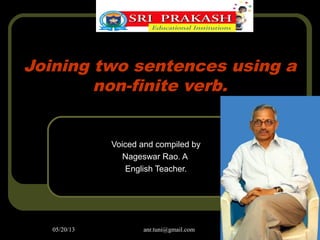How to join to sentences using a non finite verb
•Download as PPT, PDF•
2 likes•2,820 views
Report
Share
Report
Share

Recommended
More Related Content
What's hot
What's hot (20)
Jeopardy unit 29 - categorising learners' mistakes

Jeopardy unit 29 - categorising learners' mistakes
Teaching Infinitives: A Free Introductory ESL Lesson Plan

Teaching Infinitives: A Free Introductory ESL Lesson Plan
More from Sri Prakash Vidya Niketan
More from Sri Prakash Vidya Niketan (20)
ఏ ఏ సందర్బాలలో ఇంగ్లీష్ లో ‘Say’ ‘tell’ ఉపయోగించాలి.

ఏ ఏ సందర్బాలలో ఇంగ్లీష్ లో ‘Say’ ‘tell’ ఉపయోగించాలి.
How to join to sentences using a non finite verb
- 1. 05/20/13 anr.tuni@gmail.com Joining two sentences using a non-finite verb. Voiced and compiled by Nageswar Rao. A English Teacher.
- 2. 05/20/13 anr.tuni@gmail.com In this lesson let us learn how to convert a compound sentence into a simple sentence. 01. By substituting a Participle for a Finite Verb. a) The batsman took his bat & pads and walked towards the pavilion. Taking his bat & pads the batsman walked towards the pavilion. b) The teacher entered into the class and the students stood up. The teacher having entered into the class, the students stood up. 02. By substituting a Preposition etc., for a Clause. a) He not only teaches but also counsels his students. Besides teaching his students, he counsels.
- 3. 05/20/13 anr.tuni@gmail.com b) He completed his homework and then left for school. After completing his homework, he left for school. 03. By substituting an Infinitive for a Clause. a) You must work hard or else you will not pass your examination. You must work hard to pass your examination. b) Either you must prepare well for your interview or you will not get selected. To get selected, you must prepare well for your interview.
- 4. 05/20/13 anr.tuni@gmail.com Visit us at “ayalasomayajula nageswar rao” For More videos on Functional & Usage Grammar. Subscribe to our channel on You Tube
